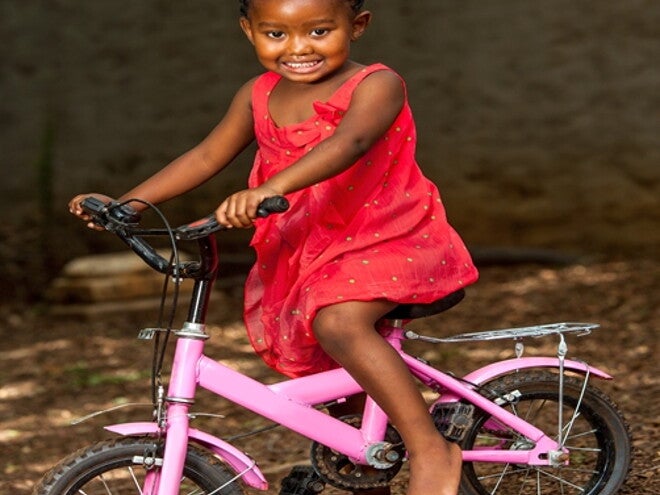
43 months Milestone
Stairs: They now walk up and down a flight of stairs easily, with sure footing and one foot to a step.
Tip-toe: Almost all three-year-olds learn to walk forwards and backwards on their toes. Towards the end of the year they learn to run on their toes.
Heel-toe: If you create a line, that is 1 ½ cm wide, with chalk or masking tape on the floor, your child can now learn to balance on it in a heel-toe position for 10 seconds.
Riding a tricycle: Being able to ride confidently and fast – without slowing down in a turn – shows that your child is developing an internal sense of balance and an awareness of the two sides of their body.
Practice makes perfect
Unlike a child’s language and thinking skills, physical skills develop pretty much on their own during the first two years. Language and thinking is shaped by a parent’s interaction with their child right from birth. However, if parents give babies space to move around, food, love and a safe environment, they will learn to sit, pull themselves up against furniture, walk, and bend over to pick things up from the floor. Parents won’t remember doing anything specific to train or teach them. The process is programmed into their DNA.
By the child’s third birthday, most parents are so used to seeing their little one’s physical skills appearing out of nowhere, that they don’t realise that things have changed.
Three-, four-, five- and six-year-olds need their parents to help them refine their movement skills. Their physical development is no longer in automatic mode. If you look at a group of three-year-olds on the playground, you’ll notice only slight differences in the way they move, how confident they are and how much they enjoy themselves.
But look at that same group three years later, when they’re six years old. Some of them will be much stronger, fitter, more agile, better coordinated and more competent than others.
Early childhood is the optimal time to develop fundamental motor skills and body awareness. Refining motor skills takes a great deal of time and effort and are best practiced while playing. It is therefore important to provide opportunities for young children to be physically active. This gives them opportunities to develop and master their motor skills. The fundamental motor skills developed during early childhood will serve as the foundation for more advanced movements required for sports later in life.
Be proactive about refining your young child’s motor skills. Find out what a child of their age should be able to do every step of the way. If you feel they are lacking confidence when they play a certain game that should be within their ability, stop and see which skills they are expected to use for playing that particular game. Then, target that skill by playing other games that also involve using that same skill. The key to helping your child reach their full potential is to strengthen weaker skills as you identify them.
As parents, we all make sacrifices to work and earn money to provide a good life for our children, but ultimately, it’s the time we invest in them that changes their lives forever.
Tip: Body awareness
It is important for your child to recognise where their body is in space so that they can navigate their environment. Body awareness tells us, for instance, how far to reach for something or how close to stand next to someone.
To support your child in this area, play a game where you ask them to touch three body parts or touch one body part with another, for example, “Touch your eyes – nose – toes!” or “Touch your foot with your elbow.”
Can your child do this with their eyes closed? This is important because it requires the skill of visualising where different body parts are in the mind’s eye.
This game is also valuable for building a child’s auditory working memory – a skill that involves keeping information in mind for long enough to be able to work with it.